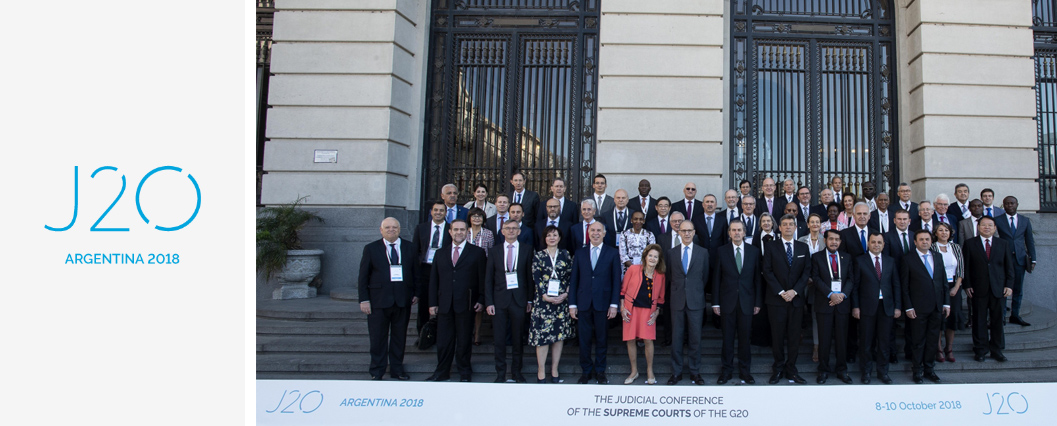

CENTRO DE INFORMACIÓN JUDICIAL AHORA EN TELEGRAM
SUSCRIBITE A NUESTRO CANAL Y RECIBÍ LAS ÚLTIMAS NOTICIAS


CENTRO DE INFORMACIÓN JUDICIAL AHORA EN TELEGRAM
SUSCRIBITE A NUESTRO CANAL Y RECIBÍ LAS ÚLTIMAS NOTICIAS


En ocasión de la Presidencia Argentina del G20 2018, la Corte Suprema de Justicia de la Nación organizó la reunión J20, Conferencia Judicial de las Cortes Supremas del G20, sobre "El papel del Poder Judicial para el Desarrollo Justo y Sostenible".
En el marco de los esfuerzos del G20 por avanzar hacia una cooperación internacional, el multilateralismo y un gobierno global, los poderes judiciales del Grupo tienen un rol esencial en la solución de los desafíos de hoy y mañana.
A partir de la visión de la presidencia argentina del G20 en 2018 "Construyendo Consenso para un Desarrollo Equitativo y Sostenible", esta Reunión analizó desde el punto de vista judicial los temas que están en la primera fila del G20: desarrollo, equidad y sostenibilidad.
Participaron de la reunión del J20 las más altas Cortes de los miembros del G20 y los máximos tribunales de España, Chile y Países Bajos. También los más altos tribunales de los países que presiden actualmente la Comunidad del Caribe (Jamaica), la ASEAN (Singapur), la Unión Africana (Ruanda) y la NEPAD (Senegal). Asimismo, los tribunales internacionales de las Organizaciones Internacionales asociadas del G20, incluidas las Naciones Unidas (Corte Internacional de Justicia), la Unión Africana (Corte Africana de Derechos Humanos y de los Pueblos) y la Comunidad del Caribe (Corte de Justicia del Caribe).
¿Cuáles son los límites para el Poder Judicial en cuanto la protección del medio ambiente para las generaciones futuras?
¿De qué manera los jueces pueden ayudar a que la ley sea la norma suprema?
¿De qué manera los jueces pueden ayudar a que la ley sea la norma suprema?
¿Cuáles son los cambios que deberían implementarse para que el sistema judicial responda mejor a las expectativas y necesidades de las personas?
¿Cómo los tribunales y el sistema legal pueden interactuar entre ellos para expandir la democracia y el mercado?
On the occasion of the Argentine Presidency G20 2018, the Supreme Court of Argentina had the honour to organise the J20 Meeting: The Judicial Conference of the Supreme Courts of the G20 'The role of the Judiciary for Fair and Sustainable Development'.
In the framework of the G20's efforts to move towards international cooperation, multilateralism and global governance, the Group's judiciaries play an essential role in solving the challenges of today and tomorrow.
Based on the vision of the Argentine Presidency in 2018 'Building Consensus for Fair and Sustainable Development', this Meeting analyses from the judicial point of view the issues that are on the G20's front line: development, fairness and sustainability.
The highest courts of the G20 members and the highest courts of Spain, Chile and the Netherlands have participated in the meeting. The Supreme Court of Argentina also invited the highest courts of the countries which currently chair the Caribbean Community (Jamaica), ASEAN (Singapore), the African Union (Rwanda) and NEPAD (Senegal). In addition, the Supreme Court of Argentina looks forward to the contributions of the International tribunals of the G20's associated international organisations, including the United Nations, the African Union (African Court of Human and Peoples' Rights) and the Caribbean Community (Caribbean Court of Justice).
How should the system of rights contribute to make society a fairer system of cooperation for mutual advantage?
What are the limits for the Judiciary in the protection of the environment for future generations?
How judges should help to make the law rule supreme?
What are the changes that should be implemented for the judicial system to be more responsive to the expectations and needs of the people?
How Courts and the legal system should interact with each other to expand democracy and the market?